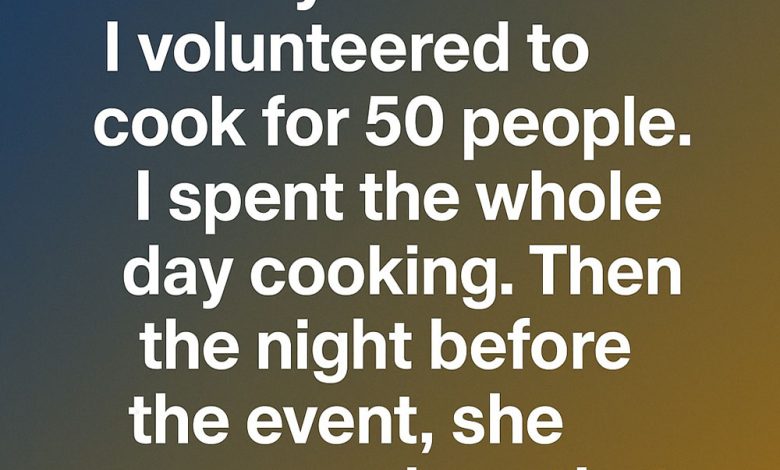She Uninvited Me From Her Baby Shower—But Still Asked Me To Cook For 50 People

The story begins with a simple, kind act: an invitation to a baby shower. The author was invited by Reva, someone she had known since high school. While they weren’t best friends, they had a history of being close, sharing college life, and helping each other out.
ADVERTISEMENT
When the invitation came, the author saw it as a chance to reconnect. She offered to help with the most significant part of any party: the food. She messaged Reva, “I’ll cook for it! Let me take care of the food.” Reva quickly replied, “OMG YES. You’re a lifesaver.”
ADVERTISEMENT
The author took this commitment seriously. She spent days planning a menu for 50 people, including three trays of biryani, two pasta bakes, garlic butter chicken, and lemon tarts. She took time off work and paid $187 for groceries, never asking for the money back.
ADVERTISEMENT
The shock arrived the morning before the party. While she was busy cooking, she received a text message. It wasn’t a call or a detailed explanation. Reva messaged her that she had to uninvite the author due to space limitations. Yet, she still expected the food to be dropped off.
Reva’s exact message was: “Hey love! I’m so grateful you offered to cook! Just a small update—we’ve had to limit guests for space, but we’d still love the food if you can bring it. Hope that’s okay!”
The author was stunned. There was no apology and very little gratitude—just the request to still provide the food. This felt like a deep personal slight.
A Friend’s Advice and the Inner Struggle
Confused and upset, the author called her cousin, Riya, and read the message aloud. Riya’s reaction was immediate and firm: “Hell no. You are not cooking for someone who uninvites you and still wants the food. Who does she think she is?”
Riya urged the author not to deliver the food, suggesting she “Keep it. Feed yourself for a week. Take it to a shelter. But do not let her walk all over you.”
Despite this clear advice, the author felt a confusing mix of habit and guilt. She had already cooked half the food, and so, she kept going. The next day, she loaded the massive trays into her car and drove to the house.
Reva didn’t even greet her at the car. She sent her cousin out to the curb instead. The cousin simply said, “Reva says thank you! This all smells amazing!” and didn’t even offer to help carry the heavy trays. The author drove away feeling like a fool and realized she was upset not just about the party, but because she felt used.
Discovering the Truth
A day later, the author shared a small, quiet post on her private social media: “Made food for 50. Got uninvited. Still dropped it off. Never again.” She didn’t name names, but an old friend, Ashir, messaged her immediately: “Wait. Are you talking about Reva’s shower??”
He then shared a shocking detail: “You’re not the only one. She did the same to Mel. Asked her to make cookies, then uninvited her too.”
The author reached out to Mel, who confirmed the story. Mel had seen pictures of the party later. She revealed, “She said the venue was ‘too small’ and they had to cut people. But then I saw pics on Facebook. There were at least 60 people there. And three cookie tables.”
The author checked Facebook and saw Reva’s full photo album. The venue was huge, and visible front and center in the pictures were her own lemon tarts. Reva hadn’t run out of space; she had simply decided to use her friends for free labor and then cut them from the guest list.
The author edited her original post to reflect the truth: “Turns out it wasn’t just me. Uninvited multiple people but still took our food. I don’t even care about the party. Just be a decent human.”
The post quickly grew, with other people sharing their own stories of being used by Reva.
Unexpected Validation and a New Beginning
The most surprising message came from Reva’s mom. She wrote a heartfelt message: “I’m so sorry this happened to you. I didn’t know until this morning. Please know you’re not alone, and what you did for her—feeding that crowd—was more gracious than she deserved.”
This message was incredibly validating. It confirmed that the author wasn’t overreacting—her feelings were justified.
Reva finally messaged the author three days later, but instead of apologizing, she criticized the author for making the situation “a public thing.” The author replied simply and directly: “I thought you were better than this too. But I guess we both learned something.” She chose silence as her final answer, which is often the most powerful response.
The positive outcome of this difficult experience was unexpected. Ashir suggested the author should start a real catering business because people trusted her cooking so much.
Taking the advice, the author created a new Instagram page for her cooking. Within a month, she landed her first paid catering job. Her business grew rapidly. Last week, she was catering a hospital fundraiser for 200 people, paid in full, and had hired two helpers.
A small but meaningful detail was the supportive comment left on her business page: “Proud of you. Let me know if you ever need referrals.” It was from Reva’s mom.
The Power of Boundaries
The author realized that the baby shower incident wasn’t a moment of bitterness, but a turning point. It taught her a crucial life lesson: kindness doesn’t mean being a doormat.
People will often take advantage of what you offer for free. The moment you start putting a price on your time and talent, the users disappear, and the real, supportive people stick around.
Ultimately, the author was uninvited, but she gained something far more valuable: a new direction in life, a strong sense of self-respect, and a thriving catering business.
If you ever feel used or taken for granted, remember this story. The right people see your value. Keep doing what you love, but be sure to set clear boundaries. You have every right to protect your time and say no when you feel like you are being treated unfairly.




